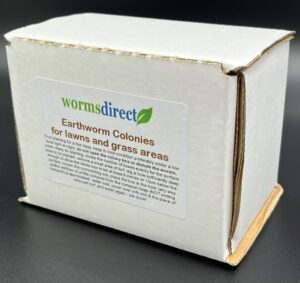A perfectly manicured, green lawn is every homeowner’s dream. But what does it take to get and maintain a beautiful lawn? We’ve done a deep dive into this topic so read on to find out how to improve your lawn with worm colonies.
What Makes a Healthy Lawn?
A healthy lawn starts with healthy soil, one that is free from toxins and, instead, rich in nutrients, beneficial bacteria and insects. Well-nourished soil is the best foundation to support healthy lawn growth by helping it resist pests, drought, and weeds.
Not sure how to improve soil? Stay away from chemical pesticides and synthetic fertilisers that harm your health and the environment, and stick to natural solutions or organic lawn fertiliser produced by worm colonies.
Benefits of Worm Colonies
If you want to know how to improve a lawn full of weeds, or simply transform your yard from dull to healthy and green, worm colonies are a perfect, natural, and cost-efficient solution. Worm colonies in your lawn are a sign of healthy soil but how do they help with lawn improvement? Here are five ways how worm colonies can improve your lawn.
1. They Improve Soil Structure
If you’ve ever noticed puddles forming in your garden after heavy rains, you know that your soil isn’t completely healthy. Worm colonies are excellent in helping soil recover simply by moving through them and digging tunnels that loosen the soil’s structure.
When earthworms dig tunnels, oxygen, water and nutrients can move more easily, allowing the soil to heal. This enables faster soil drainage and gives grass roots easier access to water. In fact, having worm colonies in your soil speeds up drainage by 10 times.
2. They Enhance Soil Fertility
As mentioned before, your lawn requires nutrients to be healthy and worm colonies naturally add those nutrients to the soil. How? Through soil-nourishing earthworm castings, or worm poop.
As earthworms tunnel through the earth, they feed on microorganisms and organic matter. These components move through their digestive system, thereby becoming more concentrated with additional nutrients and microorganisms. Once the worms excrete their castings, they then nourish the soil. Here’s how castings benefit the soil:
- Natural Fertiliser: As per the Soil Association, there are 7 times more phosphorus, 5 times more nitrogen, and 1,000 times more beneficial bacteria in earthworm castings than in regular soil. Most mainstream fertilisers also contain nitrogen and phosphorus, two vital nutrients for growing healthy grass.
- Efficient Topsoil Rebuilding – The soil’s most fertile layer is topsoil, and earthworm castings are efficient in rebuilding it. Due to climate change and erosion, most places around the world are losing topsoil, threatening the future of growing healthy crops and grass.
- Nitrogen Booster – Earthworms that die decompose rapidly, which supports the soil with even more nitrogen.
3. They Boost Root Growth
The tunnels that earthworms dig in the soil enable grassroots to grow deeper. If your soil doesn’t have earthworms, it’ll be compact without much space for root growth. Soil compaction promotes a shallow root system, which makes the soil vulnerable to disease, pests, and drought, which is counterproductive to a healthy, green lawn.
4. They Break Down Thatch
Dead and living organic material that accumulates between the soil’s surface and the grass blades is called thatch. While a thin layer of it can benefit the lawn, too much of it will attract diseases and pests, as well as block nutrients and water. Worm colonies feed on thatch, thereby breaking it down and preventing excessive buildup that could prevent healthy lawn growth.
5. They Are Food for Wildlife
Birds, frogs, and other wildlife feed on earthworms, which means having worm colonies in your soil invites amphibians and vertebrates to your garden. Birds are beneficial to your lawn as they eat and kill off weeds.
How to Get Worms to Your Yard
Now that you know that worm colonies can improve your lawn, you should create an inviting environment that attracts and keeps earthworms in your yard. Here’s how:
- Keep your soil pH above 4.5 – Since worms dislike soil that is too alkaline, acidic, wet, dry, hot or cold, it’s important that you keep your soil pH above 4.5. In fact, researchers discovered that by raising soil pH from 4.1 to 6.7, earthworm numbers doubled.
- Add organic matter to your yard – Dead or decaying plants and animal dung are primary food sources for earthworms.
- Keep soil moist – Worms require moisture to stay alive because they lose up to 20% of their body weight each day. Organic matter can help keep the soil moist.
- Avoid certain fertilisers and fungicides – Stay away from highly acidifying fertilisers like ammonium sulfate and certain fungicides as using them will result in reduced worm numbers.
- Reduce soil compaction – The more compact the soil, the more difficult it is for worms to move through it. Reducing animal and vehicle activity on your soil in wet conditions can reduce soil compaction.
- Improve drainage – Ideally, your soil is well-aerated to create an inviting home for earthworms to live in. This means you need to prevent waterlogging which may require draining the soil in wet areas.
- Reduce cultivation –As long as you keep cultivation shallow and to a minimum, earthworm numbers will not be affected.
Final Thoughts
While you can maintain your lawn by fertilising it several times a year, you’ll be doing it at the cost of the environment and your health. Instead, keep it all-natural by fostering an attractive environment for worm colonies to settle, which will increase your soil fertility and improve your lawn.
Place your order for a pack of Worm Colonies on our website today.



